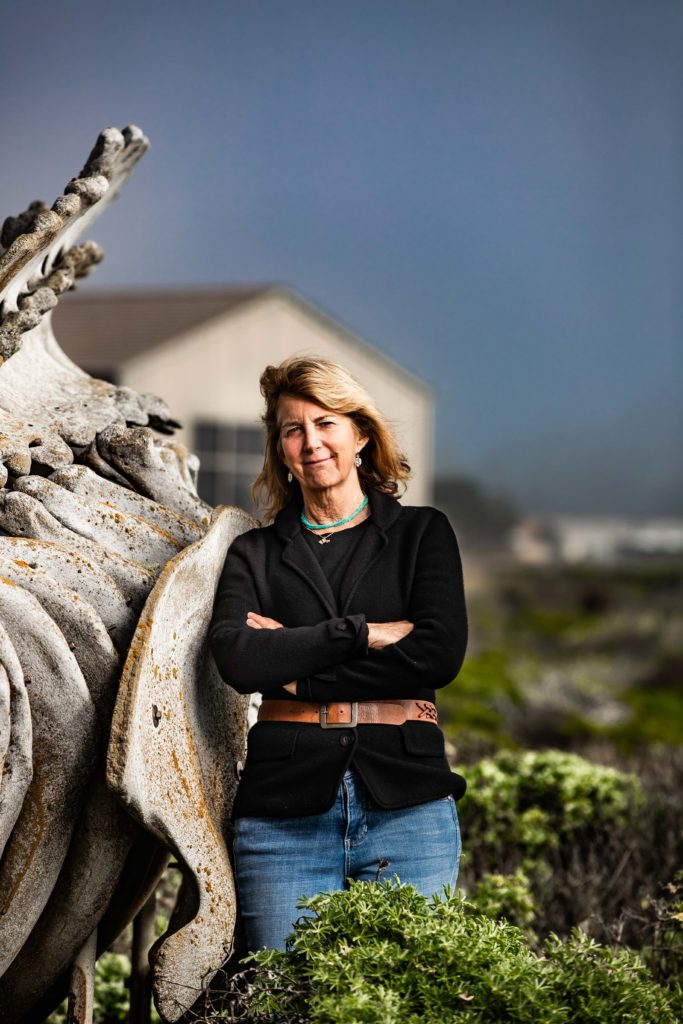Dr. Terrie M. Williams, Director of the Center for Marine Mammal Research and Conservation, University of California, Santa Cruz
Attend the free lecture by video on Thursday, January 21, 2021 from 6 to 7:30 PM PST. Register here.
The 2020 Ricketts Award recipient Dr. Terrie M. Williams will present her collaborative research examining how evolutionary processes in animal design conspire with modern anthropogenic pressures to challenge the survival of marine-living mammals. The Ed Ricketts Memorial Lecture was created to honor scientists who have exhibited exemplary work throughout their career and advanced the status of knowledge in the field of marine science. Recipients are selected by the Monterey Bay National Marine Sanctuary Research Activity Panel.
Talk title: From “Doc” and Dogs to Denizens of the Deep: How understanding biological design will save the oceans and ourselves. Abstract: In the early 1900s, the Pacific Biological Laboratories under Ed Ricketts was a storehouse of biological wonders that provided preserved marine and terrestrial specimens for study by scientists around the world. As a college student, those specimens created a foundational curiosity in biological design that shaped my entire career. For three decades, my lab and colleagues have examined how evolutionary processes in animal design conspire with modern anthropogenic pressures to challenge the survival of marine-living mammals. Marked morphological and physiological modifications necessary for transitioning from land to the sea not only represent adaptive benefits, they also provide insights into biological vulnerability (Biological Achilles’ heels) to human-induced disturbances. We find that the most recently evolved (< 10 MYA) marine-living mammals, represented by polar bears and sea otters, incur higher energetic costs for locomotion and thermoregulation compared to highly-adapted marine species from older (> 50 MYA) lineages as represented by cetaceans and manatees. Along with the energetic challenges, fur insulation and paddling forms of swimming leaves marine bears and otters vulnerable to the impacts of catastrophic oil spills. Conversely, extreme specialization for aquatic thermoregulation, swimming, and deep-diving by species such as whales and dolphins avoids these energetic problems, but can lead to increased susceptibility to environmental perturbations including extreme temperature changes and oceanic noise. Preventing animal extinctions due to our human activities will obviously depend on species-specific solutions, facilitated by recognizing how animals were originally built to survive.

Terrie M. Williams, Ph.D., is a comparative eco-physiologist with 35 years of research experience concerning the exercise physiology of terrestrial and aquatic mammals such as African lions, sea otters, narwhals, polar bears, and Weddell seals. As a Professor at the University of California- Santa Cruz, she directs the Integrative and Comparative Energetics (ICE) Lab and the Marine Mammal Physiology Project. Her research expeditions have taken her from the polar regions of the Arctic and Antarctic as well to the savannahs of Africa and the mountainous California coast. She developed many of the instruments used in her studies including submersible heart rate microprocessors for monitoring the diving responses of dolphins and whales as they feed at sea, and the S.M.A.R.T (Species Movement, Acceleration, and Research Tracking) collar that integrates the energetics and behavior of terrestrial carnivores hunting across diverse landscapes. Terrie and her students strive to understand the ecological significance of large mammals and the physiological adaptations necessary for species survival in a world that is constantly changing due to human impacts. On her most recent project, she is deploying her heart rate monitors on narwhals and is also measuring their thermal biology using infrared technology. Her primary goal is to understand how the presence of humans may disrupt the normal daily routine of these remarkable deep diving whales. Dedicated to solving challenges faced by underrepresented groups in the sciences she has written and managed GAANN education grants, and is especially interested in introducing field research to students. She has written several popular books, including, The Odyssey of KP2, about her efforts to conserve endangered Hawaiian monk seals which won the 2012 AAAS/Subaru Award for Science Book and Film Prize (Young Adult Science Books).